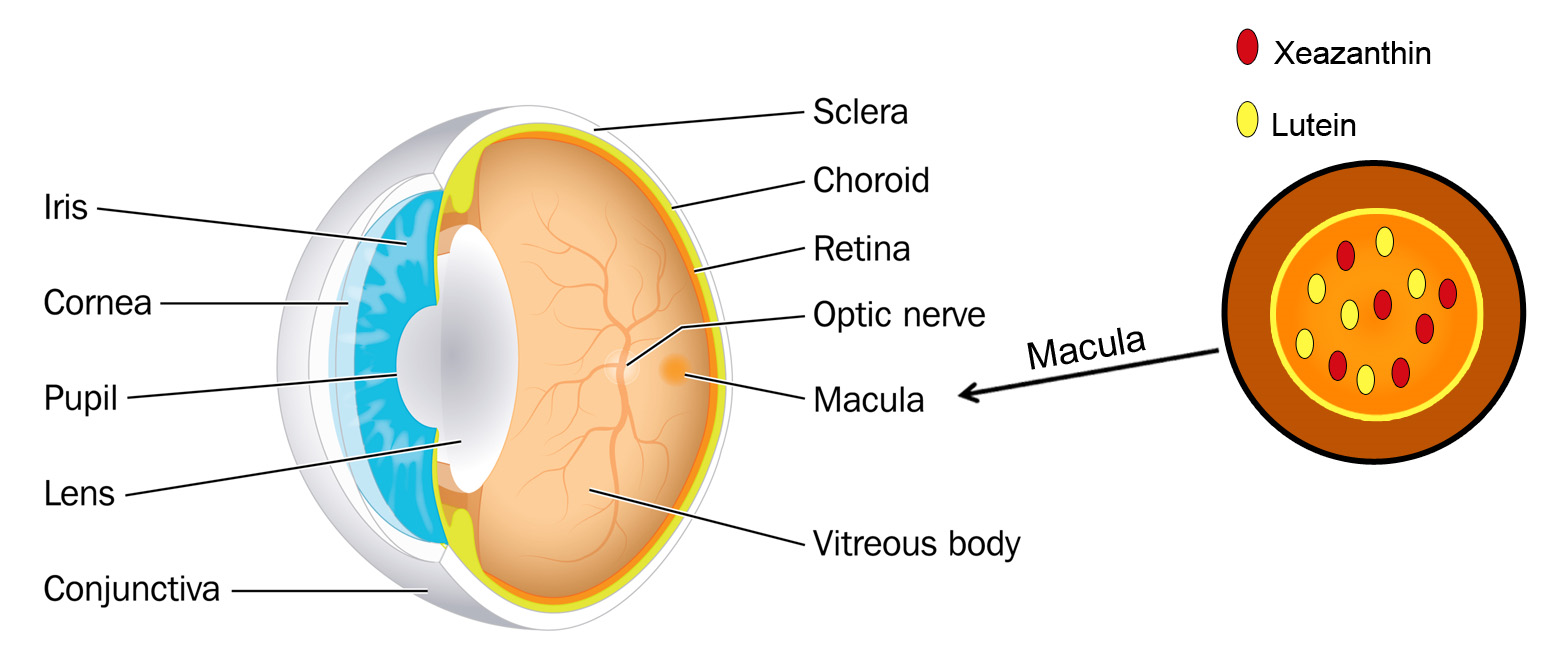Lutein for eyes to protect the secret weapon

Lutein is a carotenoid compound with powerful antioxidant properties. It plays an important role in our eyes. Lutein is found in a variety of plants, such as spinach, carrots, and citrus. By eating these lutein-rich foods, we can get enough lutein to protect eye health.
Our eyes are one of the most important sensory organs in our daily lives, so it is important to protect eye health. In addition to daily eye care, we can also improve eye health by consuming a nutrient called “lutein.” This article will delve into the structure, function and relationship between lutein and eye health to help everyone better understand lutein and apply it rationally in daily life.
Introduction to the structure and function of eye
The human visual system is a complex system composed of multiple parts that cooperate with each other. The cornea, lens, retina, and other parts of the eye perform different functions, including focusing light, sensing light signals, and transmitting information to the brain. At the same time, our eyes also face challenges from the daily environment, such as ultraviolet rays, blue light, pollutants, etc. Understanding the structure and function of the eye is fundamental to understanding how lutein protects our eyes.
Definition and sources of lutein
The eye protection mechanism of lutein
Lutein protects our eyes from damage by absorbing and filtering harmful blue light. Blue light is a high-energy light, and long-term exposure to blue light can cause retinal damage. Lutein’s molecular structure allows it to absorb and neutralize these harmful blue lights, thereby reducing the risk of retinal damage. In addition, lutein has antioxidant properties that scavenge free radicals and reduce oxidative stress, further protecting the eyes from damage. Studies show that lutein can reduce eye inflammation and slow the progression of eye diseases such as retinal degeneration.
The relationship between lutein and eye diseases
In addition to protecting the eyes from damage,Marigold Extract lutein has been linked to the prevention and treatment of some eye diseases. Studies show that people who consume enough lutein have a lower risk of developing cataracts. Additionally, lutein has been widely studied for its association with macular degenerative diseases, such as age-related macular degeneration. Appropriate intake of lutein can significantly reduce the risk of macular degeneration. By absorbing blue light, macular pigment protects the underlying photoreceptor cell layer from light damage, which may be caused by the formation of reactive oxygen species during photosensitivity reactions. There is good epidemiological evidence that the amount of macular pigment is inversely related to the incidence of age-related macular degeneration, an irreversible process and the leading cause of blindness in the elderly. Macular pigment can be increased by increasing the intake of foods rich in lutein and zeaxanthin, such as dark green leafy vegetables, or by supplementing with lutein or zeaxanthin.
Lutein intake methods and dosage recommendations
In order to obtain enough lutein to protect eye health, we can achieve the effect through food intake and dietary supplements.
Food Intake
Lutein is found in a variety of plants, including spinach, bitter greens, rapeseed, broccoli, carrots, etc. Moderate intake of these lutein-rich foods in your diet can help improve eye health. It is recommended to consume about 6 mg to 20 mg of lutein daily.
Dietary Supplements lutein
Eating foods rich in lutein can effectively reduce the incidence of macular degeneration, cataracts, atherosclerosis, and some cancers5,6; therefore, the international demand for lutein continues to increase. Lutein is the main pigment in marigold petals, accounting for 90% of the total carotenoids in the petals. Marigold is one of the main raw materials for extracting lutein and is a promising economic crop.
When choosing lutein supplements, you should choose a reputable and reliable brand. Backvita Biotech Inc. is a manufacturer that extracts lutein and zeaxanthin , from marigolds as its main product. They are very capable in terms of product expertise and production technology. They are especially good at direct connection from the supply end of raw materials to the application end where the products are made into finished products, and they will provide all technical information related to raw material products, of course. Backed by reliable literature already available in the market. In addition, they have excellent data analysts to provide customers with data analysis of the target market, helping customers to have no after-sales worries at the sales end. Below is their website for reference if needed. www.backvita.com.
Cited by
Biologic mechanisms of the protective role of lutein and zeaxanthin in the eye
Norman I Krinsky , John T Landrum, Richard A Bone
Affiliations expand PMID: 12626691 DOI: 10.1146/annurev.nutr.23.011702.073307 Review
Protecting the Eye Lens from Oxidative Stress through Oxygen Regulation.
Subczynski WK, Pasenkiewicz-Gierula M, Widomska J.Antioxidants (Basel). 2023 Sep 20;12(9):1783. doi: 10.3390/antiox12091783.PMID: 37760086 Free PMC article. Review.
Trash to Treasure: An Up-to-Date Understanding of the Valorization of Seafood By-Products, Targeting the Major Bioactive Compounds.
Roy VC, Islam MR, Sadia S, Yeasmin M, Park JS, Lee HJ, Chun BS.Mar Drugs. 2023 Sep 9;21(9):485. doi: 10.3390/md21090485.PMID: 37755098 Free PMC article. Review.
Current Advances in Bovine In Vitro Maturation and Embryo Production Using Different Antioxidants: A Review.
Naspinska R, Moreira da Silva MH, Moreira da Silva F.J Dev Biol. 2023 Aug 29;11(3):36. doi: 10.3390/jdb11030036.PMID: 37754838 Free PMC article. Review.
Pulsed Electric Field-Assisted Enzymatic and Alcoholic-Alkaline Production of Porous Granular Cold-Water-Soluble Starch: A Carrier with Efficient Zeaxanthin-Loading Capacity.
Lei H, Liao Z, Wang L, Zeng X, Han Z.Foods. 2023 Aug 24;12(17):3189. doi: 10.3390/foods12173189.PMID: 37685122 Free PMC article.
Mechanistic Understanding of the Antiviral Properties of Pistachios and Zeaxanthin against HSV-1.
Pennisi R, Trischitta P, Tamburello MP, Barreca D, Mandalari G, Sciortino MT.Viruses. 2023 Jul 29;15(8):1651. doi: 10.3390/v15081651.PMID: 37631995 Free PMC article.
See all “Cited by” articles
() ()